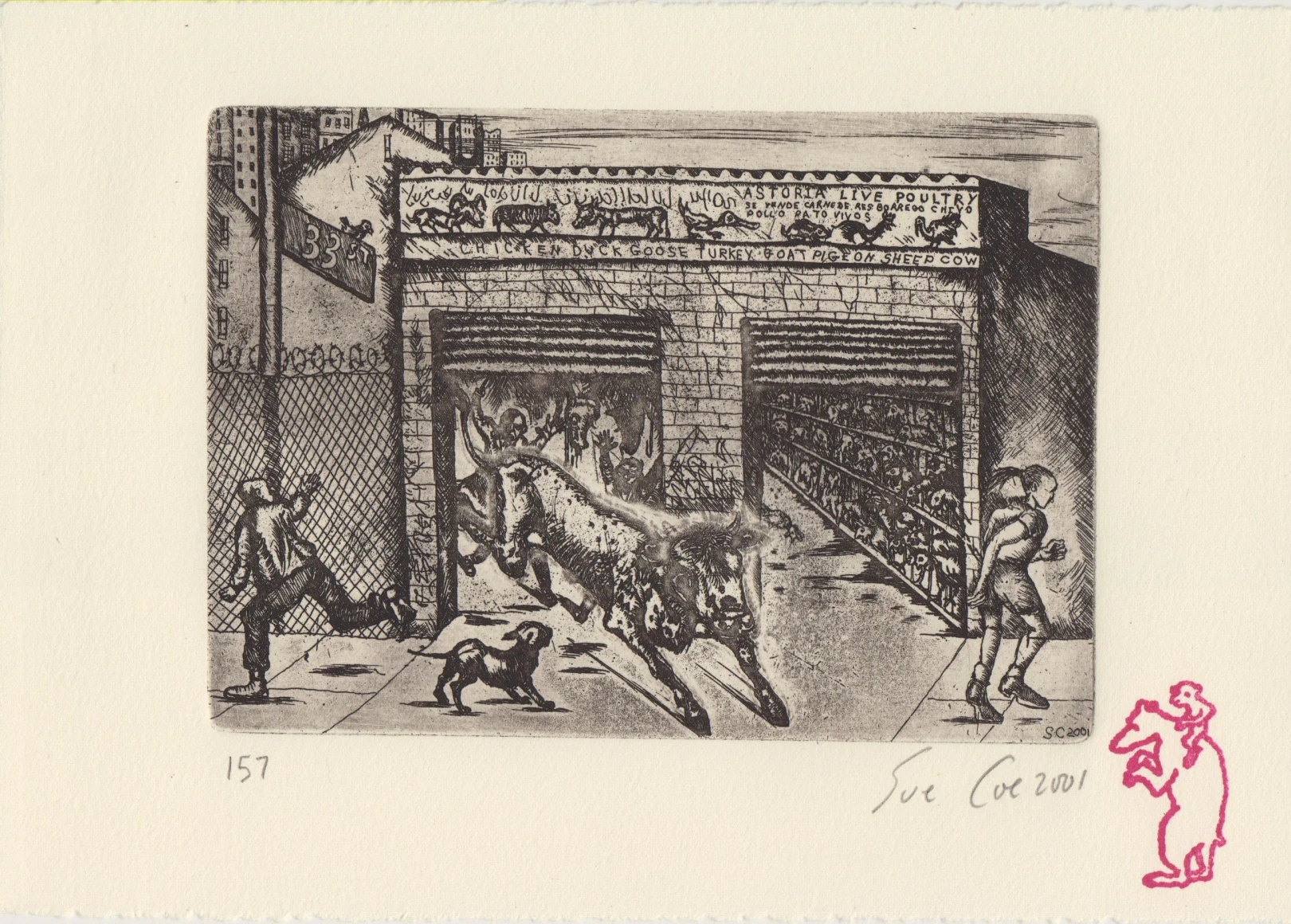A few months ago, I saw an article circle around the internet about 16-year-old Duvan Pérez, who was killed by equipment at his workplace in a poultry processing plant. His death is a tragedy, but an unsurprising one. In a report from OSHA, Mar-Jac Poultry (the company responsible for Pérez’s death) is said to have continued failing to consider worker safety after another machine related death occurred in May 2021; they are also currently under investigation for child labor violations. This is not an anomaly—the animal agriculture industry is notoriously dangerous. The cost of meat is more than just animal lives.
The capitalist treatment of animal products is a threat to the labor movement, and as we pride ourselves on being by and for the working class, the socialist vision at the very least should include an immediate end to the factory farming of nonhuman animals. The struggle for animal liberation has a material impact not only on nonhuman animal welfare, but also on the lives and health of the rest of us—particularly of workers. No one should be subjected to spending their days in a slaughterhouse killing for a living.
Imagine waking up in the early hours of the morning, arriving at a warehouse full of sad, filthy, bleating animals, to wrap yourself in a plastic sheet so that blood doesn’t stain your clothes. Imagine then spending most of your day lining up the animals, shooting, bludgeoning, and slitting their throats, or filing them into gas chambers. All for pennies. If this seems cruel, don’t worry, because these are actually the humane methods of slaughter: “a single blow or gunshot or an electrical, chemical or other means that is rapid and effective, before being shackled, hoisted, thrown, cast, or cut.” After fulfilling your quota for the day, you’ll hose off the ground, fold up and discard your bloodied tunic and go home, only to repeat the entire day over again as long as you can stand. This is your means of subsistence.
Even in an alternate reality, where the rights and safety of slaughterhouse workers are considered, I can’t imagine a scenario where it’s ethical to subject someone to this type of labor. No one should have to kill, especially not with modern agricultural convenience making it possible to live a plant-based lifestyle healthily. It can sometimes be difficult, and it’s definitely less convenient, but if you are a well-off person in relatively good health, I would question your reasoning for not adopting a vegan or at least vegetarian practice. We’re going to need to adapt to new lifestyles either way, as climate change destroys our arable land.
It can be easy to write off animal liberation as a movement for the liberal bourgeois, but the heart of the movement stands strongly with socialist principles. Growing up cramped in cages only to be killed by a throat-slitting is not “humane.” No good for the working class will come out of the maintenance of animal agriculture; it is critical that we do away with all work that requires workers to take on the role of executioner for sustenance. As socialists, we pursue justice, but why should justice start and stop at human life? When we dream of a fair future, does it include butchery?
If you aren’t convinced by the labor issues, there’s also the all-important environmental implications of animal agriculture to consider. We understand that the impact of individuals is limited, which can discourage us from making personal changes, but we can still form mass movements around our beliefs and actions which do create the material changes we seek. One feasible and impactful option is eliminating our consumption of animal products.
I often see citations describing soy and almonds as harmful to the planet, but animal agriculture is far worse. One thing to consider is that the sum of land used by animals and the farmland for their feed makes up 80% of our agricultural land. There are some plant foods, like coffee and almonds, that use an abundance of labor and natural resources to produce. That impact is real, and my goal is not to take away from it, but also to point out that livestock comes with the hidden costs of feed and pasture, and that additional cropland and water use adds up. We’re not only taking up more land than we need in order to sustain animal agriculture, but also destroying terrestrial and aquatic habitats with the associated waste and runoff.
The last thing I’d like to be considered is that of our ethics in relation to the animals themselves. Animals feel pain, they have nervous systems, they play. These are known and observable facts. I would encourage everyone to learn more about what goes on inside slaughterhouses (especially the “humane” ones) as well as what happens on farms. There is plenty of material investigating these industries. The labels “free-range”, “organic”, and “humane”, probably mean something different to you than they do to the people putting those standards in place.
In rethinking the world post-revolution, I don’t believe that there is any place for animal products being produced for our pleasure. In fact, I don’t see a place for our ready consumption of animal products now. How do we decide whose body we are able to exploit for our own means? Does a belief that we are a superior species justify our commodification and consumption? The cows who made up the hamburgers I often enjoyed as a child did nothing to justify my parents paying for a wage laborer to slit their throats. Animal agriculture is violence, but is it necessary?
Capitalism has alienated us from what we consume, but this is not an excuse. My encouragement is to confront yourself—your beliefs, habits, biases—and consider if they align with the future you want to be a part of, and the world you want to see. As we build our movement towards global justice and fight for a fair future, remember whose bodies we take for granted every day. My hope, and one which I think we share, is a wish to see a world where we have no tolerance for exploitation and we include all in the struggle for liberation.





Leave a Reply